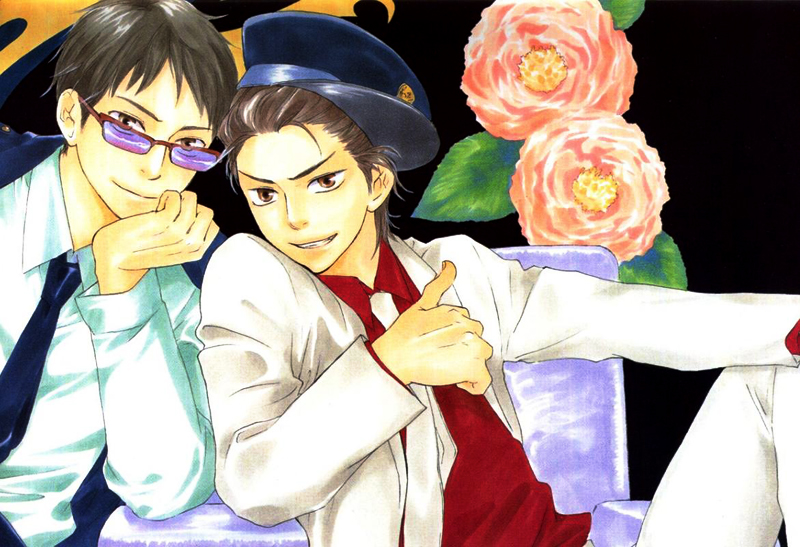Whenever I submit proposals to my old university, professors will always ask me “Why historical manga?”
The whole world believes that comics are just comics. They are a shallow form of entertainment that exists to amuse us and that in itself is not bad but what I look at is to what degree are we amused and how does our amusement affect us.
It’s a little harder when tracing the effects of a particular manga to a particular population however, I realize, that as long as a manga exists, its values, mores, style, and art remains timeless and continues to be influential.
All the more when it’s historical manga.
The Power of Historical Manga
One of the things that some critics and academics who look into historical manga will agree on is how dangerous historical manga is. It isn’t dangerous because they’re thick and fat (imagine a copy of Vertical’s Buddha being thrown your way!) but it is dangerous because it is powerful. And this power can go two ways.
On a good end it has the power to bring forth a story lost in history. A historian will whine how we have lost so many nameless and voiceless individuals who were present in history but never made a relevant mark that catapulted them to public fame. History’s grand narrative will always focus on the big political names, but historical manga allows people to read a possibly nameless individual who have lived at one time.
 Take Kaoru Mori’s Emma for example. Domestic life in Victorian England has always been within the context and perspective of its owners. Statistics on employment rates, owner’s logs of wages, and housekeeping diaries seem to be the only point of view that we’ll ever have. If you’re lucky, you’d probably get some letters. But not many of these are documented or remembered. Thus, with good research, a manga like Emma can bring life to a possibly nameless maid forever lost in history.
Take Kaoru Mori’s Emma for example. Domestic life in Victorian England has always been within the context and perspective of its owners. Statistics on employment rates, owner’s logs of wages, and housekeeping diaries seem to be the only point of view that we’ll ever have. If you’re lucky, you’d probably get some letters. But not many of these are documented or remembered. Thus, with good research, a manga like Emma can bring life to a possibly nameless maid forever lost in history.
The danger with this power is it is imagined. Kaoru Mori didn’t live in Victorian Engalnd nor was she a maid. But she did do her research, from the facade of London’s streets to the grandeur of English mansions. Early photographs gave her inspiration to draw Emma’s iconic image. Documented history gave her story a setting that is both complicated and intricate. Everything else is to her imagination. Of course Emma is one of the better historical manga that manages to capture the life of its subject.
But what about Hetalia’s imagination of Japan’s takeover of China, particularly the Rape of Nanking? Was that appropriated properly? With reactions like this one, it makes you wonder how one misplaced imagination can stir a different memory of events. One could even wonder about Nobunaga’s multiple historical mangas and how some have placed him as the demon that he was known in history while others ride on his betrayed feelings and his compassion. Many historical manga ride on an imagined identity of its characters and this usually rides on the creator’s own imagination. Like many historicized documents, the disposition, knowledge, and position of the author shifts interpretations o f history in ways both accepted or unaccepted by society.
More than the imagined history of lost voices, there are those who managed to live through an event and tell a compelling story. The power in an autobiography and even a semi-biography lies in its raw and often unadulterated perspective of an event. Perhaps, due to some editorial issues, images may have been toned down but the story will still feel the weight of the author’s experience.
 Critics appreciate the honesty that comes with autobiographical manga. Shigeru Mizuki’s Onwards Towards Our Noble Death immerses his readers through his experience in New Britain (Papua New Guinea). And while many were moved by the personal heroism of Mizuki and his mates, it is in many ways a history of Mizuki’s perspective of World War II, a position that some historians and academics are not taking lightly — the idea that Japan too was a victim of war.
Critics appreciate the honesty that comes with autobiographical manga. Shigeru Mizuki’s Onwards Towards Our Noble Death immerses his readers through his experience in New Britain (Papua New Guinea). And while many were moved by the personal heroism of Mizuki and his mates, it is in many ways a history of Mizuki’s perspective of World War II, a position that some historians and academics are not taking lightly — the idea that Japan too was a victim of war.
Mizuki’s influence as a writer puts power into his war stories. People read him. In Japan, everyone reads him. In fact, Onwards Towards Our Noble Death is just a smidgeon of many biographies that Mizuki has written about the war. And it’s not just him. We have Osamu Tezuka writing his own experience of the war. Of course, there’s Keiji Nakazawa’s own fictionalized experience with Barefoot Gen. These men all speak of the horrors of war and all have claimed an agenda in their comics.
The power lies in how many of these biographical comics, particularly those that pertain to the war becomes politicized. Informal as they, their stories move readers to sympathize and make them believe in the purpose of their comic and their agenda. Barefoot Gen, for example, has been criticized for its anti-war sentiments, particularly in its position in highlighting Japan’s victimized past through the Hiroshima bombing. And there are many other criticisms, all leading to a propaganda and revisionism. A comic leads not only a national debate but also a global exchange on the power of a comic and how it affects how we remember things.
Social Memory
The most powerful aspect of historical manga is its ability to affect social memory.
Just think how much our thoughts about a particular historical period or event has changed because of that one really good comic that made us believe that world, that reality existed. Emma has made us love and sympathize with English maids and Victorian England. Barefoot Gen has made us completely denounce nukes and made a nation feel how they were victimized as a nation.
Readers gain context in historical manga and we lose context at the same time. The success of a historical manga also means the rate in which people’s memories are slowly changing.
 There’s no manga on the Battle of Manila. Not a lot of people, particularly Japanese, know the horrors the Japanese brought on Philippine shores. But had Mizuki been sent here than New Britain, would it have been different? What kind of war will Japan remember? And imagine what memories will be instilled in is.
There’s no manga on the Battle of Manila. Not a lot of people, particularly Japanese, know the horrors the Japanese brought on Philippine shores. But had Mizuki been sent here than New Britain, would it have been different? What kind of war will Japan remember? And imagine what memories will be instilled in is.
Arguments against history lies in its antiquity and its irrelevance. How the crap are we to even connect to people who didn’t even have cellphones? We’re not in the middle of a war so this sense of urgency and survival is not important. And all these names are long gone and forgotten and knowing them won’t make a difference at all in my life. What’s the point in reading all these memoirs when I can read about pirates elsewhere?
Memories, while fragmented and ancient, is fully present because of its emotions. And historical manga carries these emotions that we bear with every page we read. Laced with these memories are realities that we can possibly experience if we don’t treasure or disregard previous histories that have shaped and changed our lives.
We learn from history. We change as people because of history. There is wisdom found in the lives of the soldier, the monarch, the samurai, and even the maid.
Never will historical manga be irrelevant.

